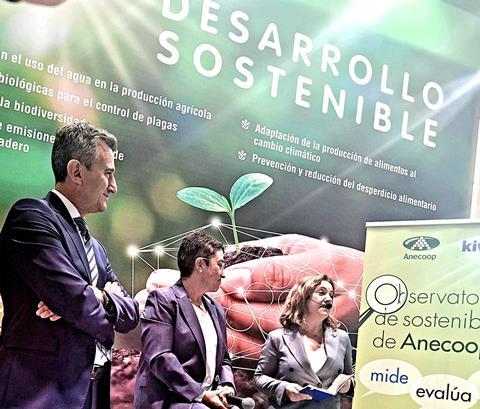The new Sustainability Observatory will measure the social, economic and environmental impact of the group’s actions
Anecoop has unveiled a new initiative to bring greater transparency and accountability to the sustainability efforts of its grower members and Spain’s agri-food industry as a whole.

The Sustainability Observatory was presented by Anecoop president, Alejandro Monzón, the company’s director of quality and sustainability, Mari Carmen Morales and Rosa Valenzuela of Kiwa R+D+i, the independent accreditation body that will oversee the project, at this week’s Fruit Attraction.
Under the motto ‘Measure, evaluate, act’, the project aims to establish a reference framework to measure, correctly and accurately, the impacts and improvements that Anecoop and its partners can have on the sustainability of the agri-food system, as well as the quantification and social, economic and environmental impact of their actions.
The aim of the observatory is to develop new precision indicators that can be to improve sustainability policies across the entire production process throughout Spain.
Morales commented: “The project proposes the creation of a platform as a solution to collect, analyse and visualise data, facilitating the monitoring of key sustainability indicators”.
The project methodology will allow Anecoop to prioritise areas in which it wants to implement quality through sustainability. “We want to be more than a producer and marketer of fruits and vegetables, we want to be pioneers in the implementation of tools to identify, quantify and measure sustainability criteria, as well as establish a culture of business sustainability at all levels,” said Monzón.
The initiative is based on three basic pillars: to develop a medium and long-term strategy based on concrete actions, to research and develop specialised tools and make them available to Anecoop partners, and to train associated companies in this area.
“The project proposes the creation of a platform as a solution to collect, analyse and visualise data, facilitating the monitoring of key sustainability indicators. But it also includes a campus that will provide specialised training to educate and accredit the technical team, and reference publications and traceability reports will be made available to member companies,” said Morales.
Kiwa’s Valenzuela added: “in the Anecoop Sustainability Observatory, innovation will be a constant. Not only in terms of sustainability and the sector’s capacity to adapt to climate change, but also in terms of its potential to mitigate its impact through sustainable, intelligent and competitive agriculture”.



